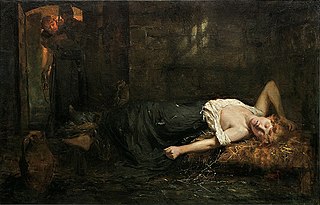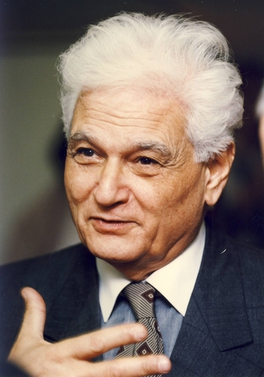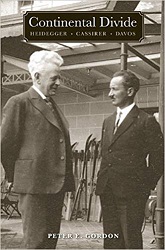
Hans-Georg Gadamer was a German philosopher of the continental tradition, best known for his 1960 magnum opus, Truth and Method, on hermeneutics.

Nihilism is a philosophy, or family of views within philosophy, that rejects generally accepted or fundamental aspects of human existence, such as objective truth, knowledge, morality, values, or meaning. The term was popularized by Ivan Turgenev, and more specifically by his character Bazarov in the novel Fathers and Sons.

Martin Heidegger was a German philosopher who is best known for contributions to phenomenology, hermeneutics, and existentialism. He is among the most important and influential philosophers of the 20th century. He has been widely criticized for supporting the Nazi Party after his election as rector at the University of Freiburg in 1933, and there has been controversy about the relationship between his philosophy and Nazism.

Jacques Derrida was an Algerian-born French philosopher. He developed the philosophy of deconstruction, which he utilized in numerous texts, and which was developed through close readings of the linguistics of Ferdinand de Saussure and Husserlian and Heideggerian phenomenology. He is one of the major figures associated with post-structuralism and postmodern philosophy although he has distanced himself from post-structuralism and "never used this word [postmodernity]".

Richard McKay Rorty was an American philosopher. Educated at the University of Chicago and Yale University, he had strong interests and training in both the history of philosophy and in contemporary analytic philosophy. Rorty had a long and diverse academic career, including positions as Stuart Professor of Philosophy at Princeton University, Kenan Professor of Humanities at the University of Virginia, and Professor of Comparative literature at Stanford University. Among his most influential books are Philosophy and the Mirror of Nature (1979), Consequences of Pragmatism (1982), and Contingency, Irony, and Solidarity (1989).

Continental philosophy is a term used to describe some philosophers and philosophical traditions that do not fall under the umbrella of analytic philosophy. However, there is no academic consensus on the definition of continental philosophy. Prior to the twentieth century, the term "continental" was used broadly to refer to philosophy from continental Europe. A different use of the term originated among English-speaking philosophers in the second half of the 20th century, who used it to refer to a range of thinkers and traditions outside the analytic movement. Continental philosophy includes German idealism, phenomenology, existentialism, hermeneutics, structuralism, post-structuralism, deconstruction, French feminism, psychoanalytic theory, and the critical theory of the Frankfurt School as well as branches of Freudian, Hegelian and Western Marxist views.

Being and Time is the 1927 magnum opus of German philosopher Martin Heidegger and a key document of existentialism. Being and Time had a notable impact on subsequent philosophy, literary theory and many other fields. Though controversial, its stature in intellectual history has been compared with works by Kant and Hegel. The book attempts to revive ontology through an analysis of Dasein, or "being-in-the-world." It is also noted for an array of neologisms and complex language, as well as an extended treatment of "authenticity" as a means to grasp and confront the unique and finite possibilities of the individual.

Contemporary philosophy is the present period in the history of Western philosophy beginning at the early 20th century with the increasing professionalization of the discipline and the rise of analytic and continental philosophy.

The linguistic turn was a major development in Western philosophy during the early 20th century, the most important characteristic of which is the focusing of philosophy and the other humanities primarily on the relations between language, language users, and the world.
Neopragmatism, sometimes called post-Deweyan pragmatism, linguistic pragmatism, or analytic pragmatism, is the philosophical tradition that infers that the meaning of words is a result of how they are used, rather than the objects they represent.

Contingency, Irony, and Solidarity is a 1989 book by the American philosopher Richard Rorty, based on two sets of lectures he gave at University College, London, and at Trinity College, Cambridge. In contrast to his earlier work, Philosophy and the Mirror of Nature (1979), Rorty mostly abandons attempts to explain his theories in analytical terms and instead creates an alternate conceptual schema to that of the "Platonists" he rejects. In this schema "truth" is considered unintelligible and meaningless.
In Being and Time, the philosopher Martin Heidegger made the distinction between ontical and ontological, or between beings and "being" as such. He labeled this the "Ontological Difference." It is from this distinction that he developed the concept of "Fundamental Ontology."
Michael Friedman is an American philosopher who serves as Professor of Philosophy and the Frederick P. Rehmus Family Professor of Humanities at Stanford University. Friedman is best known for his work in the philosophy of science, especially on scientific explanation and the philosophy of physics, and for his historical work on Immanuel Kant. Friedman has also done historical work on figures in continental philosophy such as Martin Heidegger and Ernst Cassirer. Friedman also serves as the co-director of the Program in History and Philosophy of Science and Technology at Stanford University.

Carlin Romano is an American writer and educator. Romano writes for The Chronicle of Higher Education.
Peter Eli Gordon is a historian of philosophy, a critical theorist, and intellectual historian. The Amabel B. James Professor of History at Harvard University, Gordon focuses on continental philosophy and modern German and French thought, with particular emphasis on the German philosophers Theodor Adorno and Martin Heidegger, critical theory, continental philosophy during the interwar crisis, and most recently, secularization and social thought in the 20th century.

The Cassirer–Heidegger debate was an encounter between the philosophers Martin Heidegger and Ernst Cassirer from March 17 to April 6, 1929 during the Second Davos Hochschulkurs which held its opening session in the Hotel Belvédère in Davos on 17 March 1929. Cassirer gave four lectures and Heidegger gave three lectures. The debate was about the significance of Kantian notions of freedom and rationality.
Richard L. Velkley is an American philosopher and Celia Scott Weatherhead Distinguished Professor of Philosophy at Tulane University. Velkley is known for his expertise on Kant, Rousseau, and post-Kantian philosophy. He is a former associate editor of The Review of Metaphysics (1997–2006) and a former president of the Metaphysical Society of America (2017–18).
Alejandro Arturo Vallega Arredondo is a Chilean-born philosopher, continental philosopher, decolonial thinker, writer, painter, and Professor of philosophy at the University of Oregon. In his work he develops an aesthetic philosophy, in which he engages the aesthetic or pre-reflexive affective, embodied and memorial dimensions of philosophical understanding. In the recent years he has emphasized this approach to philosophical understanding in seeking to extend the field of Continental philosophy, engaging Latin American Philosophy of Liberation and decolonial thought. Vallega has been co-director of the Collegium Phänomenologicum twice and is active member of the director's board. He served in the past as president of North American Society for Philosophical Hermeneutics. Among his editorial activities, he is the editor of the English version of Enrique Dussel's Ethics of Liberation, and he is editor of the World Philosophies Series, published by Indiana University Press. In the last years he has developed a body of art works under the theme of "elemental painting."
Sean Joseph McGrath is a Canadian philosopher and Professor of Philosophy at Memorial University of Newfoundland. He is known for his published work in the history of philosophy and the philosophy of religion. Major single-authored works include The Dark Ground of Spirit: Schelling and the Unconscious (2012), Thinking Nature: An Essay in Negative Ecology (2019), and The Philosophical Foundations of the Late Schelling: The Turn to the Positive (2021). McGrath was awarded the President's Award for Outstanding Research at Memorial University in 2012. He was inducted into the Royal Society of Canada as Member of the College of New Scholars in 2014. In 2022, in collaboration with the Centre of the Cross, McGrath released a series of podcasts on secular Christianity called Secular Christ.

Continental Divide: Heidegger, Cassirer, Davos is a 2010 book by Peter Gordon, in which the author reconstructs the famous 1929 debate between Martin Heidegger and Ernst Cassirer at Davos, Switzerland, demonstrating its significance as a point of rupture in Continental thought that implicated all the major philosophical movements of the day. Continental Divide was awarded the Jacques Barzun Prize from the American Philosophical Society in 2010.












